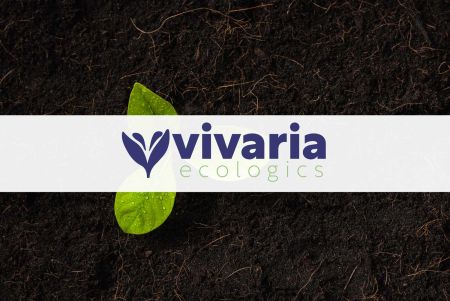
From weak supply chains to fertilizer shortages to how we handle food waste, our systems are fragile. Vivaria Ecologics is reimagining how we approach food systems by closing the loop on food waste. Every year an estimated 5.7 million tons of food waste goes to landfill in the state of New Jersey alone according to the New Jersey Department of Environmental Protection’s 2020 80x50 Report. Food waste that gets sent to landfill generates methane–a potent greenhouse gas. Vivaria seeks to put food waste to work through developing food waste recycling options that generate clean, valuable compost.
“Food waste is a significant problem in our food systems, but where there are big problems there are big opportunities,” said Vivaria Ecologics Founder and President Christina PioCosta-Lahue. “We, as a society, are fortunate to be able, for the most part, to walk into grocery stores and buy food, so we don’t often think about where our food comes from or what happens to food that isn’t consumed,” she continued. “Our food supply relies upon complex, but ultimately fragile systems. Only recently, the fragility of our food systems has been brought into sharper focus by the Covid-19 pandemic.”
PioCosta-Lahue is CEO of Rensselaer Commercial Properties, a commercial real estate firm based in Fairfield, NJ. PioCosta-Lahue developed plans to launch Vivaria Ecologics last year, eying a pilot project on a farm owned by her family since the 1960s in Mansfield, Warren County.
“We had this piece of working farmland in Warren County that has been in our family for generations,” said PioCosta-Lahue. “When I took over as CEO of Rensselaer Commercial Properties, I looked at our entire portfolio to see where we could make more efficient and beneficial use of land,” PioCosta-Lahue continued. “I saw a lot of opportunity at the Blau Road Farm, as we call it, to both preserve agricultural heritage, while bringing a new economic development opportunity to the community.”
A new law in New Jersey took effect in October of 2021 that requires large producers of food waste to recycle food scraps instead of sending them to landfill if there is a facility within 50 road miles. Currently, there is not nearly enough recycling capacity available to meet the state’s food waste reduction objectives. Vivaria Ecologics plans to use aerated static pile technology (ASP) for their sites. ASP enables more efficient processing of food waste, while significantly reducing the possibility of odor escape and contamination.
“To make a meaningful impact on food waste, we need to be able to bring these types of facilities online,” said PioCosta-Lahue. “In addition to reducing food waste, we’d be expanding access to compost. By increasing access to compost you effectively strengthen local food systems,” she continued. “Currently, if you need large amounts of compost for agricultural, landscaping or construction purposes in New Jersey you most likely have to ship it in from out of state, which is problematic in and of itself.”
The name “Vivaria Ecologics'' stems from the Latin “Vivaria,” meaning “places of life,” and “Ecologics,” stemming from the word “ecological”, the study of the relationships between living organisms. Beyond composting, we’re going to look at entire food systems, from the production of food and supply chains, to how food is marketed and distributed to local communities,” PioCosta-Lahue said of the future.

